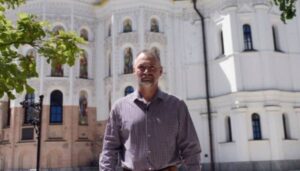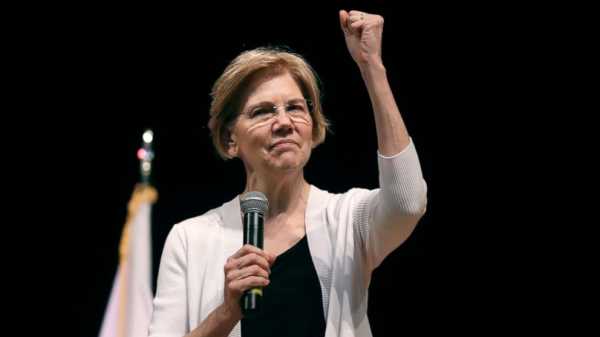
Following Democrats’ sweeping victories in the House of Representatives during the 2018 midterm elections, many in the party were eagerly anticipating the 2020 presidential election and the opportunity to unseat President Donald Trump.
Interested in 2020 Elections?
Add 2020 Elections as an interest to stay up to date on the latest 2020 Elections news, video, and analysis from ABC News.
2020 Elections
Add Interest
The field of candidates remains large, even with candidates dropping out.
Rep. Eric Swalwell, D-Calif., bowed out after the first Democratic debates in Miami. In August, former Sen. Mike Gravel, D-Alaska, former Colorado Gov. John Hickenlooper, Washington Gov. Jay Inslee, Rep. Seth Moulton, D-Mass., and Sen. Kirsten Gillibrand, D-N.Y., followed suit. New York City Mayor Bill de Blasio announced he was bowing out on Sept. 20 and about a month later, Rep. Tim Ryan, D-Ohio, ended his run. Former Rep. Beto O’Rourke surprised his supporters when he announced he was leaving the campaign trail on Nov. 1.
Three Republican challengers also declared their intention to run, even as some state party officials were canceling their nominating contests. Former South Carolina Gov. Mark Sanford suspended his challenge to Trump in the Republican primary two months after announcing.
Here’s a list of all the candidates in the race (in alphabetical order):
Sen. Michael Bennet, D-Colo.
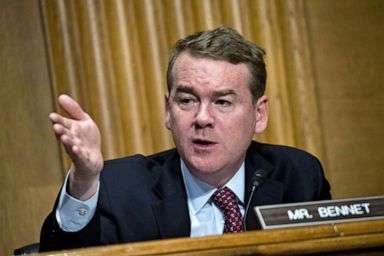
Andrew Harrer/Bloomberg via Getty Images
Senator Michael Bennet, a Democrat from Colorado, questions Wilbur Ross, U.S. commerce secretary, not pictured, during a Senate Finance Committee hearing on current and proposed tariff actions in Washington, D.C., June 20, 2018.
The senior senator from Colorado announced his presidential bid during a May 2 appearance on , just weeks after a successful prostate cancer operation.
Bennet said his ability to win over Republican constituents and colleagues, and his “broad” experience in the public and private sectors, distinguish him in a crowded Democratic field.
“I think this country faces two enormous challenges, among others,” he said in the CBS interview. “One is a lack of economic mobility and opportunity for most Americans, and the other is the need to restore integrity to our government.”
(MORE: Michael Bennet: Everything you need to know about the 2020 presidential candidate)
Bennet caught people’s attention with a viral speech on the Senate floor during the government shutdown in January. He tore into Sen. Ted Cruz, R-Texas, for the role he said he played during another government shutdown in 2013.
The former school superintendent is now the 21st Democratic candidate, the seventh senator and second Coloradoan — after his colleague, former Gov. John Hickenlooper — to enter the race.
Former Vice President Joe Biden
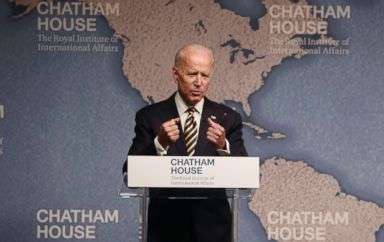
Alastair Grant/AP
Former United States Vice President Joe Biden speaks at the Royal Institute of International Affairs at Chatham House in London, Oct. 10, 2018.
The former vice president and senator from Delaware became the 20th candidate in the Democratic field after announcing his bid April 25 in an online video.
In the video, he denounced the white supremacists who marched on Charlottesville in 2017 and President Donald Trump’s response, calling it a “defining moment for this nation in the last few years.”
“We are in a battle for the soul of this nation,” Biden said in the video.
(MORE: Joe Biden: Everything you need to know about the 2020 presidential candidate)
Biden’s campaign website lays out the three pillars of his campaign: rebuilding the middle class, reclaiming American leadership on the world stage and fostering an inclusive democracy—notions that he said are at stake in the coming election.
“Folks, America is an idea. An idea that’s stronger than any army, bigger than any ocean, more powerful than any dictator or tyrant. It gives hope to the most desperate people on earth, and guarantees that everyone is treated with dignity, and gives hate no safe harbor. It instills the belief in everyone in this country that no matter where you start in life, there’s nothing you can’t achieve if you work at it,” he said later in his announcement video.
Biden enters the race with the kind of name recognition that makes him a de facto frontrunner. But he’ll also face questions about accusations from women about unwanted touching, money, messaging, age, identity and ideology in a political environment vastly different from the one he began his career in decades ago.
Sen. Cory Booker, D-N.J.
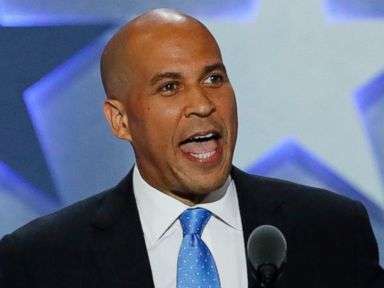
J. Scott Applewhite/AP Photo
Sen. Cory Booker, D-NJ., speaks during the first day of the Democratic National Convention in Philadelphia, Pennsylvania, July 25, 2016.
The New Jersey senator and former mayor of Newark declared his candidacy on Feb. 1 after spending time last year campaigning for Democrats in Iowa, Nevada, South Carolina and Mississippi.
Booker has thus far campaigned on a message of unity and collective action, promising to bring Democrats and Republicans together like he has on issues such as criminal justice reform during his time in the Senate.
“I think a lot of folks are beginning to feel that the forces that are tearing us apart in this country are stronger than the forces that tie us together. I don’t believe that,” Booker said on “The View” the day he announced his campaign. “So, I’m running to restore our sense of common purpose, to focus on the common pain that we have all over this country.”
(MORE: Cory Booker: Everything you need to know about the 2020 presidential candidate)
Montana Gov. Steve Bullock
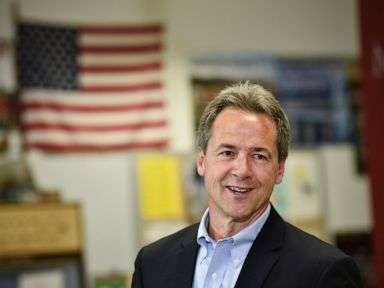
Thom Bridge/Independent Record via AP
Montana Gov. Steve Bullock, Democratic presidential candidate, officially announces his campaign for president, May 14, 2019, at Helena High School in Helena, Mont.
Montana Gov. Steve Bullock is most notably known for winning in 2016 as a Democrat in a state that helped elect Trump. In May, Bullock kicked off his bid as the 22nd presidential candidate to throw his hat in the ring.
“As a Democratic governor in a state Trump won by 20 points, I don’t have the luxury of only talking to people who agree with me,” Bullock said in his announcement video. “I go all across our state’s 147 thousand square miles and look for common ground to get things done.”
As governor, he expanded Medicaid to adults making less than about $17,000 per year and garnered support for abortion rights, while many other conservative states lean toward stricter laws.
(MORE: Steve Bullock: Everything you need to know about the 2020 presidential candidate)
Before becoming governor, Bullock served as a two-term attorney general for Montana. He fought to separate “dark money” and politics, challenging the the Citizens United decision in the Supreme Court in 2012. The Court eventually ruled against him in a 5-4 decision on American Tradition Partnership, Inc. v. Bullock. He continues to fight “dark money,” according to his announcement video.
“Today we see evidence of a corrupt system all across America — a government that serves campaign money, not the people,” Bullock said
Soon after his announcement video was released, Bullock held an event at his former high school in Helena, Montana, where he acknowledged the challenge of ahead of him to qualify for the debate but again touted his win in a red state.
“The debate stage would be lacking a bit if they didn’t have somebody that actually got reelected in a state Donald Trump won,” he said.
South Bend, Indiana, Mayor Pete Buttigieg
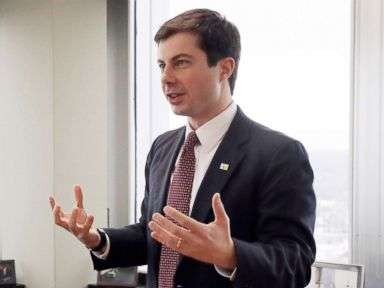
Nam Y. Huh/AP
Mayor Pete Buttigieg talks with an AP reporter at his office in South Bend, Ind., Thursday, Jan. 10, 2019.
Buttigieg first made a national name for himself with a bid for Democratic National Committee chair in 2017. At 37 years old, he is the youngest candidate in the 2020 race, and could also become the first gay man to be elected president.
While he trails many of his opponents in name recognition, Buttigieg argues that he could represent a generational shift in government, and speaks frequently of issues that will affect younger Americans, such as tax reform, gun control and climate change.
(MORE: Pete Buttigieg: Everything you need to know about the 2020 presidential candidate)
“I get the audacity of somebody like me talking about running for this office, but frankly it’s a leap for anybody,” Buttigieg said on ABC’s “This Week” in February. “And yet all of the people who had that job have been mortals who just bring their experience to the table. My experience is that of guiding a city through transformation, and I think a mayor at any level has the kind of executive frontline government experience and, by the way, problem-solving experience that we need more in Washington right now.”
After signaling his intention to run when he launched an exploratory committee in January, Buttigieg officially entered the race on April 14 at a rally in his hometown of South Bend.
“The forces of change in our country today are tectonic,” Buttigieg said. “Forces that help to explain what made this current presidency even possible. That’s why, this time, it’s not just about winning an election — it’s about winning an era.”
Former Secretary of Housing and Urban Development Julian Castro

Eric Gay/AP Photo
Housing and Urban Development Secretary Julian Castro addresses the Texas Democratic convention, June 17, 2016, in San Antonio.
Castro, who served as mayor of San Antonio, Texas, before spending over two years in President Barack Obama’s cabinet, announced his campaign in his hometown in January.
“I’m running for president because it’s time for new leadership, because it’s time for new energy, and it’s time for a new commitment to make sure that the opportunities I’ve had are available for every American,” he said.
In 2016, Castro was vetted by Hillary Clinton to be her running mate, but the spot ultimately went to Sen. Tim Kaine, D-Va. This year, he says he is eager to restore the style of leadership the nation had under Obama.
(MORE: Julián Castro: Everything you need to know about the 2020 presidential candidate)
Former Rep. John Delaney, D-Md.
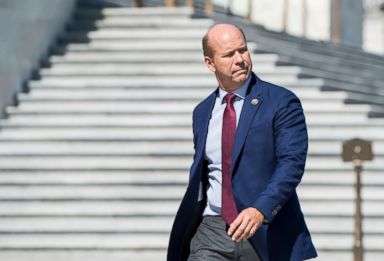
Bill Clark/CQ Roll Call/Getty Images
Rep. John Delaney, D-Md., walks by the Capitol, Oct. 2, 2017.
The Maryland congressman was only seven months into his third term when he announced his candidacy in July 2017, becoming the first member of Congress to launch a bid in the 2020 cycle.
While Delaney, a millionaire entrepreneur and businessman before arriving in Congress, does not have the name recognition of the other likely candidates, he has already traveled to all of Iowa’s 99 counties — a right of passage for many caucus hopefuls — and frequently discusses his pragmatic approach and desire to bridge political gaps.
“What the American people are really looking for is a leader to try to bring us together, not actually talk like half the country’s entirely wrong about everything they believe,” Delaney said on “This Week” in January, adding, “One of the things I’ve pledged is in my first hundred days, only to do bipartisan proposals. Wouldn’t it be amazing if a president looked at the American people at the inauguration and said, ‘I represent every one of you, whether you voted for me or not and this is how I’m going to prove it.'”
(MORE: John Delaney: Everything you need to know about the 2020 presidential candidate)
Rep. Tulsi Gabbard, D-Hawaii
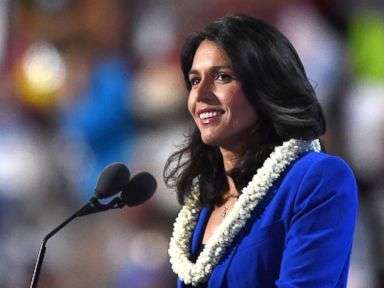
Timothy A. Clary/AFP/Getty Images, FILE
Representative Tulsi Gabbard speaks during Day 2 of the Democratic National Convention in Philadelphia, July 26, 2016.
Democrat and Iraq War veteran Gabbard announced her presidential bid in January in an appearance on CNN.
“When we stand together, united by our love for each other and for our country, there is no challenge we cannot overcome. Will you join me?” Gabbard tweeted.
Early on in her campaign, the first American Samoan and the first Hindu member of Congress faced questions over her work in the early 2000’s for an anti-gay organization run by her father, and her defense of Syrian President Bashar al-Assad, with whom she controversially met in 2017.
(MORE: Tulsi Gabbard: Everything you need to know about the 2020 presidential candidate)
Sen. Kamala Harris, D-Calif.
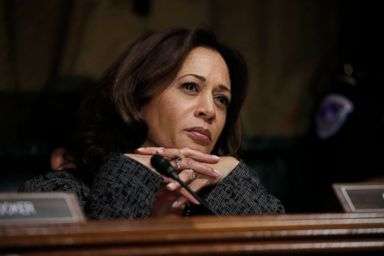
Jim Bourg/Pool Photo via AP, FILE
Sen. Kamala Harris listens as Christine Blasey Ford testifies before the Senate Judiciary Committee on Capitol Hill in Washington, Sept. 27, 2018.
Following months of speculation surrounding the California junior senator, Harris officially announced her 2020 candidacy on ABC’s “Good Morning America” in January.
“I love my country. I love my country,” she said. “This is a moment in time that I feel a sense of responsibility to stand up and fight for the best of who we are.”
If Harris were to win the 2020 presidential election, she would become the first woman and woman of color to ascend to the nation’s highest office.
(MORE: Kamala Harris: Everything you need to know about the 2020 presidential candidate)
Sen. Amy Klobuchar, D-Minn.
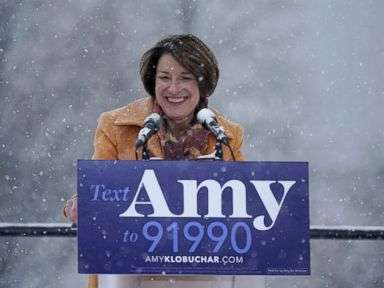
Anthony Souffle/Star Tribune via AP
Sen. Amy Klobuchar greets the crowd before announcing her bid for president at Boom Island Park in Minneapolis, Feb. 10, 2019.
Klobuchar launched her campaign on a snowy February day in Minneapolis, laying out a platform that included a constitutional amendment to overturn the Citizen’s United Supreme Court decision, signing back on to the Paris climate agreement, and advocating for criminal justice reform and universal health care.
“I’m running for every parent who wants a better world for their kids,” Klobuchar said at her opening rally. “I’m running for every student who wants a good education. For every senior who wants affordable prescription drugs. For every worker, farmer, dreamer, builder. For every American. I’m running for you.”
The Minnesota senator is viewed favorably by some in Democratic circles for her ability to perform strongly in her home state — part of a Midwestern region that helped President Trump to victory in 2016.
(MORE: Amy Klobuchar: Everything you need to know about the 2020 presidential candidate)
Former Massachusetts Gov. Deval Patrick
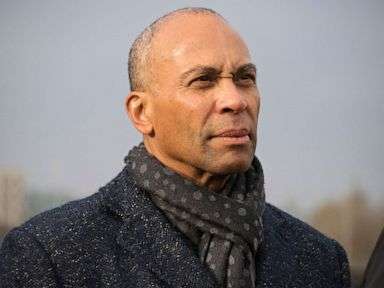
Jeff Topping/Polaris via Newscom
Former Massachusetts governor and Democratic candidate for president Deval Patrick listens to Iowa state Senator Rob Hogg speak in Cedar Rapids, Iowa, Nov. 18, 2019.
Deval Patrick, the former two-term governor of Massachusetts and the state’s first black chief executive, formally announced a bid for the Democratic presidential nomination in a sharp reversal from his 2018 decision to not pursue a run — injecting more uncertainty into an unsettled primary less than three months before the first votes.
“I’ve had the chance to live my American dream,” he said in a November announcement video. “But over the years, I’ve seen the path to that dream closing off bit by bit. The anxiety and even anger that I saw in my neighbors on the South Side, the sense that the government and the economy were letting us down, were no longer about us, is what folks feel all over America today in all kinds of communities.”
(MORE: Deval Patrick: ‘I wouldn’t be in it if I didn’t think I could win it’)
Following his announcement, he traveled to New Hampshire and filed paperwork to appear on the primary ballot. It was a day before the deadline to file.
While in Manchester, New Hampshire, he told ABC News’ Whit Johnson, “I wouldn’t be in it if I didn’t think I could win it.”
Sen. Bernie Sanders, I-Vt.
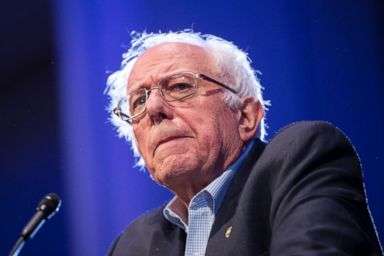
Jacob Hamilton/Ann Arbor News via AP
Sen. Bernie Sanders speaks in support of Abdul El-Sayed at a Get Out The Vote rally for Michigan Democratic gubernatorial candidate Abdul El-Sayed at Cobo Center in Detroit, Aug. 5, 2018.
After a 2016 campaign that saw him amass millions of supporters even as he finished second to Hillary Clinton, Sanders entered the 2020 race in February, predicting victory and pointing to the progressive ideas he had championed as an outsider during the last cycle, like Medicare for All and free college tuition, that have since become increasingly mainstream.
In an email to supporters announcing the launch of his campaign, Sanders further took aim at President Trump, using some of the starkest language of a Democratic candidate up to that point.
“You know as well as I do that we are living in a pivotal and dangerous moment in American history,” he wrote. “We are running against a president who is a pathological liar, a fraud, a racist, a sexist, a xenophobe and someone who is undermining American democracy as he leads us in an authoritarian direction.”
(MORE: Bernie Sanders: Everything you need to know about the 2020 presidential candidate)
Former Rep. Joe Sestak, D-Pa.
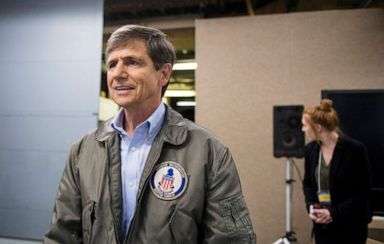
Bill Clark/CQ-Roll Call,Inc. via Getty Images, FILE
Former Rep. Joe Sestak leaves after the Senate Democrats primary debate in Pittsburgh, April 5, 2016.
Sestak, a former Pennsylvania congressman and a retired three-star admiral in the U.S. Navy, announced in a video on his campaign website that he is running for president in 2020.
“Thank you for joining me as I explain why I am declaring my candidacy for president of the United States of America,” he said at the beginning of the nearly three-minute video. “I’m Joe Sestak, and I wore the cloth of the nation for over 31 years in peace and war, from the Vietnam and Cold War eras, to Afghanistan and Iraq and the emergence of China.”
“Born and raised in Pennsylvania, I grew up in this global canvas of service in the United States Navy … I learned integrity’s values by my parents living them: service to country, to others above self, with accountability, in answering for oneself,” he says.
Sestak began his career in the Navy in 1974, before becoming the highest-ranking military officer ever elected to Congress in 2007, according to his campaign website. He served in the House until 2011.
In 2016, he competed in the Democratic primary to unseat Sen. Pat Toomey in a tough battleground race but was defeated by Democratic rival Katie McGinty.
He entered the field at the onset of the week of the first presidential debates in Miami on June 26 and 27.
(MORE: Joe Sestak: Everything you need to know about the 2020 presidential candidate)
Tom Steyer
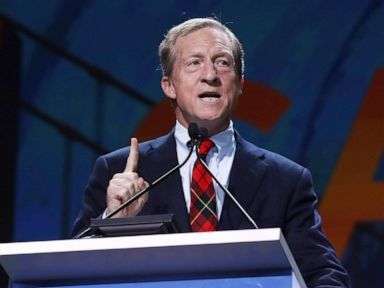
Justin Sullivan/Getty Images, FILE
Tom Steyer speaks during the California Democrats 2019 State Convention at the Moscone Center on June 01, 2019, in San Francisco.
Tom Steyer, a billionaire liberal activist from California, in July became the 26th major Democratic figure to enter the 2020 race, reversing course on a statement he made months earlier saying he wouldn’t run.
“As an outsider, I’ve led grassroots efforts that have taken on big corporations and won results for people. That’s not something you see a lot of from Washington these days. That’s why I’m running for President,” Steyer said in a statement, released alongside his announcement video.
Steyer has poured millions of his own money into electing Democrats throughout the years, and said in January that he would redouble his efforts to impeach the president instead of seeking the Democratic presidential nomination in 2020.
But in a tweet following his presidential campaign announcement, he conceded that his efforts to “hold the president accountable” are “not enough.”
In his four-minute announcement video, Steyer unveiled a campaign platform that focused on curbing the influence of corporations in politics and combating climate change.
“Really what we’re doing is make democracy work by pushing power down to the people,” he said.
(MORE: Billionaire activist Tom Steyer enters 2020 presidential contest, after passing on bid earlier this year)
President Donald Trump
On the same day he assumed the office of the presidency in 2017, Trump filed preliminary paperwork with the Federal Election Committee (FEC) to qualify as a presidential candidate for 2020.
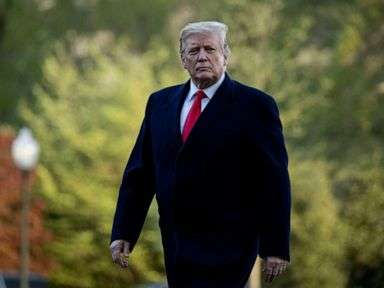
Andrew Harnik/AP, FILE
PHOTO:President Donald Trump walks on the South Lawn as he arrives at the White House in Washington, April 15, 2019.
Trump’s re-election campaign announced in early April that it raised more than $30 million in the first quarter of 2019, a total that outpaces all of his Democratic rivals and indicates he will be well-resourced in his bid for a second term in the Oval Office.
(MORE: President Trump’s re-election campaign announces $30 million fundraising haul in first quarter of 2019)
“Our prodigious fundraising is further proof of President Trump’s clear record of accomplishment on behalf of the American people,” wrote Brad Parscale, campaign manager for President Trump’s re-election campaign.
Former Illinois Rep. Joe Walsh, R-Ill.
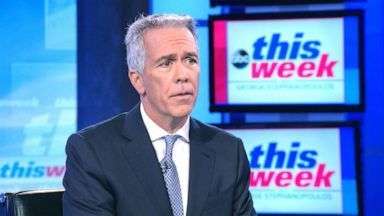
ABC News
Former Congressmen Joe Walsh announces Republican presidential primary challenge against President Trump on ABC’s "This Week," Aug. 25, 2019.
Conservative firebrand former Illinois Rep. Joe Walsh announced in August on ABC’s “This Week” that he’s launching a long-shot Republican presidential primary challenge against the president.
When ABC News Chief Anchor George Stephanopoulos pointed out the massive uphill climb Walsh has in front of him in the primary thanks to Trump’s overwhelmingly high approval rating within the party, the controversial former congressman argued that conservatives should have an alternative to the president.
(MORE: Joe Walsh announces GOP primary challenge against Trump)
“I’m running because he’s unfit; somebody needs to step up and there needs to be an alternative. The country is sick of this guy’s tantrum — he’s a child,” said Walsh, who was elected to the House in the 2010 Tea Party wave, but only served one term before becoming a conservative talk radio host.
The former Illinois congressman-turned-radio host was once a fervent Trump supporter who’s become a fierce critic of the president. Walsh is just the second Republican to jump into the primary.
Sen. Elizabeth Warren, D-Mass.
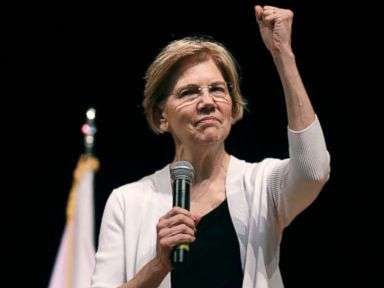
Charles Krupa/AP
Sen. Elizabeth Warren gestures during a town hall style gathering in Woburn, Mass., Aug. 8, 2018.
After establishing a presidential exploratory committee just before New Year’s, Warren officially joined the race in February with an event in Massachusetts.
“This is the fight of our lives,” the senator said. “The fight to build an America where dreams are possible, an America that works for everyone. I am in that fight all the way.”
A prolific fundraiser whose staffers spent time in a number of early primary states assisting other Democrats, Warren said in September that following the midterms she would “take a hard look at running for president,” becoming one of the first major names to take steps towards a run.
(MORE: Elizabeth Warren: Everything you need to know about the 2020 presidential candidate)
Former Massachusetts Gov. Bill Weld
Former Massachusetts Gov. Bill Weld announced in April that he’s officially running for president, becoming the first Republican to mount a primary challenge against President Donald Trump.
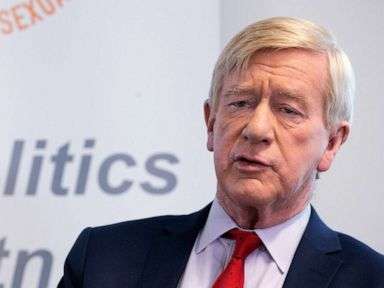
Cj Gunther/EPA via Shutterstock, FILE
Former Governor Bill Weld campaigns in Concord, New Hampshire, March 26, 2019.
Weld, a current partner at the Mintz Levin law firm and the 2016 vice presidential candidate for the Libertarian Party, said he would have been “ashamed” if he passed on running against the president for the Republican party nomination.
(MORE: Former Gov. Bill Weld to challenge President Donald Trump for 2020 GOP nomination)
“I’d be ashamed of myself if hadn’t raised my hand and said, ‘Count me in,'” he told ABC News shortly after his announcement. “I think that the president is a very divisive force and that’s just not my style, and it’s not what Americans deserve.”
Marianne Williamson
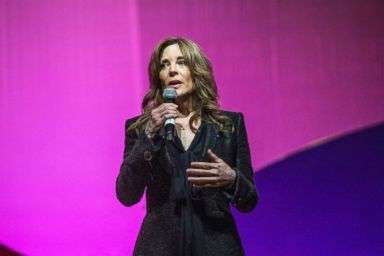
Amy Harris/Invision/AP, FILE
Marianne Williamson seen on day three of Summit LA17 in Downtown Los Angeles’s Historic Broadway Theater District, Nov. 5, 2017, in Los Angeles.
Author Marianne Williamson announced the launch of her campaign in Los Angeles in January after making six trips to Iowa and one to New Hampshire over the past year as she explored a bid.
Williamson is best known outside of political circles as the author of several popular self-help books and as a “spiritual friend and counselor” to Oprah Winfrey with multiple appearances on her show and television network.
She also ran to represent California’s 33rd congressional district in 2014 as an independent, finishing fourth in the open primary, after endorsements from then-Rep. Keith Ellison, former Govs. Jennifer Granholm and Jesse Ventura, and former Reps. Dennis Kucinich and Alan Grayson.
(MORE: Marianne Williamson: Everything you need to know about the presidential candidate)
Andrew Yang

Phil Long/AP
Andrew Yang, a candidate in the Democratic primaries for president, arrives at a town hall meeting sponsored by the Euclid chapter of the NAACP at Christ Lutheran Church in Cleveland, Feb. 24, 2019.
Yang, an entrepreneur, is running a presidential campaign most commonly noted for its support of universal basic income — a pledge to provide all Americans 18 and older with $1,000 per month.
Yang speaks frequently about both income inequality and the economic transformation that has enriched certain parts of the country while disproportionately harming regions that have failed to keep pace.
(MORE: Andrew Yang: Everything you need to know about the 2020 presidential candidate)
“I was stunned when I saw the disparities between Detroit and San Francisco or Cleveland and Manhattan. You feel like you’re traveling across dimensions and decades and not just a couple of time zones,” Yang told “Rolling Stone” in January. “None of our political leaders are willing to acknowledge the elephant in the room that is tearing our communities apart, in the form of technological change.”
New York City Mayor Bill de Blasio

Yana Paskova/Getty Images, FILE
New York City Mayor Bill De Blasio holds a rally in New York City, May 13, 2019.
New York City’s mayor released a video on Youtube, announcing his campaign launch on ABC’s “Good Morning America.”
De Blasio, who is in his second term, joined a crowded field of nearly two dozen Democrats in the race for the White House. The central theme of de Blasio’s campaign was “working people first.”
(MORE: Bill de Blasio: Everything you need to know about the 2020 presidential candidate)
He’s been New York City’s mayor since January 2014. In that role, he implemented universal pre-K and signed an executive order to exchange single-use plastics for compostable or recycling alternatives in an effort to reduce carbon emissions, plastic pollution and wildlife risks.
“Working Americans deserve better,” de Blasio told ABC News Chief Anchor George Stephanopoulos on “Good Morning America” on May 16. “Right now the federal government is not on the side of working people, and that’s because Donald Trump is playing a big con on America.”
On Sept. 20, de Blasio announced he was dropping out of the race. The New York City Mayor struggled in the polls and did not qualify for the third round of Democratic primary debates, hosted by ABC News.
“Getting out there, being able to hear people’s concerns, address them with new ideas has been an extraordinary experience,” he said on MSNBC’s “Morning Joe.” “But I have to tell you, at the same time I feel like I’ve contributed all I can to this primary election and it’s clearly not my time. So I’m gonna end my presidential campaign, continue my work as mayor of New York City, and I’m gonna keep speaking up for working people.”
While he did not make an endorsement for another candidate, de Blasio said he’ll support whomever secures the Democratic nomination.
Sen. Kirsten Gillibrand, D-N.Y.
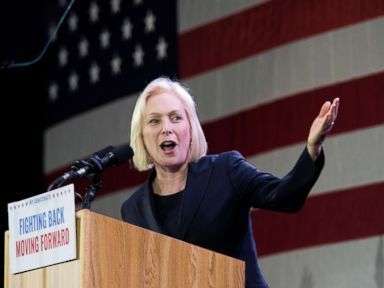
Mary Altaffer/AP
Sen. Kirsten Gillibrand, speaks to supporters during an election night watch party hosted by the New York State Democratic Committee, Nov. 6, 2018, in New York, after being re-elected.
The New York Democrat formally announced her presidential run on March 17 in a video posted to her verified YouTube account. In January, she had announced that she was forming a presidential exploratory committee during an appearance on CBS’ “The Late Show with Stephen Colbert.”
“I’m going to run for president of the United States because, as a young mom, I’m going to fight for other people’s kids as hard as I would fight for my own,” she said during the interview.
Gillibrand’s past moderate political positions have stoked speculation that she could be a strong general election candidate, but some of her old stances, like support for gun control that once earned her an “A” rating from the NRA, could hinder her during the Democratic primaries. She has argued that her thinking on some topics has evolved since joining the Senate.
On Aug. 28, Gillibrand announced she was ending her presidential campaign.
In a video posted to her Twitter account, Gillibrand thanked her supporters and made a call to action to defeat Trump and secure a Democratic majority in the U.S. Senate.
“We wanted to win this race, but it’s important to know when it’s not your time, and to know how you can best serve your community and country,” she said. “I believe I can best serve by helping to unite us to beat Donald Trump in 2020.”
(MORE: Kirsten Gillibrand: Everything you need to know about the 2020 presidential candidate)
Former Sen. Mike Gravel, D-Alaska
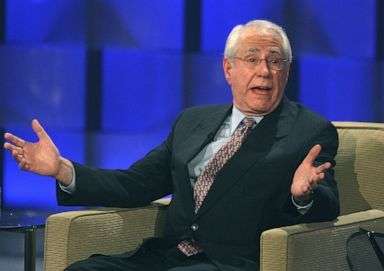
Robyn Beck/AFP/Getty Images
Democratic presidential hopeful Mike Gravel speaks at the Visible Vote ’08 Presidential Forum, Aug. 9, 2007, in Los Angeles.
Mike Gravel’s unlikely bid for president was launched by two teenagers who learned about him through a podcast and encouraged the former Alaska senator to run for president in 2020.
Having failed to make the debate stage during the first two Democratic debates, Gravel’s team decided to close up shop on their campaign and redirect their efforts towards a think tank. In a video posted to Twitter, he endorsed Sanders for president. His campaign was being transitioned into a progressive think tank called the Gravel Institute.
(MORE: Mike Gravel: Everything you need to know about the 2020 presidential candidate)
Former Colorado Gov. John Hickenlooper
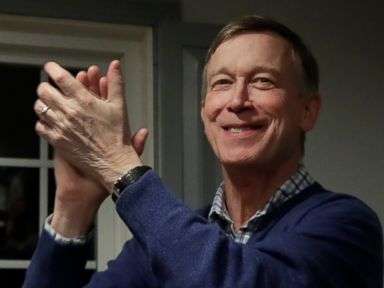
Elise Amendola/AP
Former Colorado Gov. John Hickenlooper, left, applauds at a campaign house party, Feb. 13, 2019, in Manchester, N.H.
Hickenlooper joined the field in early March, seeking to parlay his success in growing Colorado’s economy while passing environmental regulations and gun control laws into a successful presidential campaign. In a launch video, he spoke further of healing the nation’s political divisions.
“I’m running for president because we need dreamers in Washington, but we also need to get things done,” he says. “I’ve proven again and again I can bring people together to produce the progressive change Washington has failed to deliver.”
Prior to his two terms as governor, Hickenlooper worked as a geologist before starting a brewery and serving as mayor of Denver, and said that the variety of experiences have one common theme.
“One thing I’ve shown I can do, again and again, is create teams of amazingly talented people and really address these issues that are the critical issues facing this country,” he said on “Good Morning America.”
He also announced he was suspending his campaign with a video.
“While this campaign didn’t have the outcome we were hoping for, every moment has been worthwhile and I’m thankful to everyone who supported this campaign and our entire team,” he said in the video posted to Twitter.
(MORE: John Hickenlooper: Everything you need to know about the 2020 presidential candidate)
Washington Gov. Jay Inslee
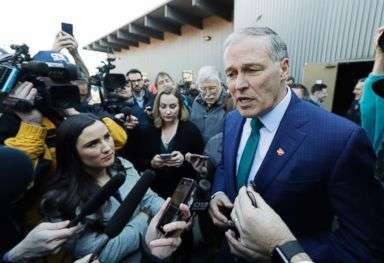
Ted S. Warren/AP
Washington Governor Jay Inslee answers questions from reporters after speaking at a campaign event in Seattle, March 1, 2019.
Inslee became the first sitting governor to join the presidential field when he kicked off his campaign in early March.
The Washington governor is currently serving his second term in Olympia after more than two decades as a member of Congress, and said that while he is proud of efforts to raise the state’s minimum wage and increase access to early childhood education, his presidential bid would prioritize climate change, which he labeled an “existential threat” during his launch event.
On Aug. 21, he announced on MSNBC that he was dropping out of the race.
“It’s become clear that I’m not going to be carrying the ball, but we’re going to make sure somebody is,” he said in the interview.
(MORE: Jay Inslee: Everything you need to know about the 2020 presidential candidate)
Miramar, Florida, Mayor Wayne Messam

Joe Raedle/Getty Images, FILE
Wayne Messam speaks at a rally at Florida Memorial University in Miami Gardens, Florida, March 30, 2019.
The little-known Florida mayor joined the growing list of 2020 presidential candidates, announcing his candidacy on March 28 despite facing an uphill climb for his bid.
He announced that he was suspending his presidential campaign on Nov. 20 in a tweet.
“I am Suspending My 2020 Presidential Campaign But I’m Not Finished Yet,” he posted on the morning of the fifth Democratic debate in Atlanta.
Messam is currently the chief executive of a city of 140,000 residents — more than the population of the city Buttigieg runs in Indiana. He is known by many Floridians for playing football for Florida State University in the 1990s.
“When people get elected into Washington with no local government experience, they are so high in the stratosphere that they have no concept, no consciousness of some of the local challenges that cities and communities face. And America is basically a network of cities and communities,” Messam said, according to the Associated Press.
(MORE: Wayne Messam: Everything you need to know about the 2020 presidential candidate)
Rep. Seth Moulton, D-Mass.
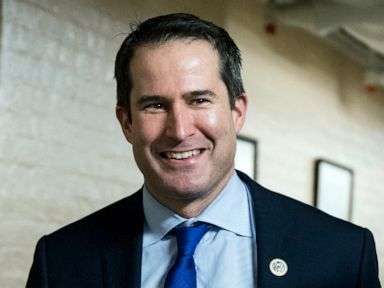
Bill Clark/CQ-Roll Call,Inc./Getty Imnages, FILE
Seth Moulton arrives for the House Democrats’ caucus meeting in the Capitol, Nov. 15, 2018, in Washington, DC.
Rep. Seth Moulton, a 40-year-old Democrat from Massachusetts, formally announced his presidential bid for 2020, expanding the Democratic field to 19 candidates.
Moulton, a Marine veteran who served in Iraq, is known as an outspoken critic of his own party. He was elected to the House in 2013.
During the 2018 midterms, Moulton raised more than $4 million through his Serve America PAC to support Democratic candidates running in battleground states. Before announcing his candidacy, he had already laid groundwork for his 2020 campaign, already visiting Iowa, South Carolina, New Hampshire and Nevada.
(MORE: Seth Moulton: Everything you need to know about the 2020 presidential candidate)
On Aug. 23, 2019, Moulton dropped out of the race. He told The New York Times, “I think it’s evident that this is now a three-way race between Biden, Warren and Sanders, and really it’s a debate about how far the left wing party should go.” He will seek re-election in the House to represent the 6th district of Massachusetts, according to The Times.
Former Rep. Beto O’Rourke, D-Texas
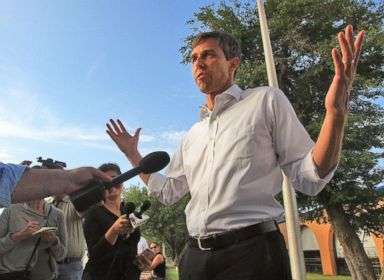
Joel Martinez/The Monitor via AP
Candidate for U.S. Senate from Texas, Beto O’Rourke speaks during a news conference at the Hidalgo Memorial Park in Hidalgo, Texas, Monday, June 11, 2018.
O’Rourke announced an end to his presidential campaign via Twitter on Nov. 1.
“Our campaign has always been about seeing clearly, speaking honestly, and acting decisively. In that spirit: I am announcing that my service to the country will not be as a candidate or as the nominee,” he wrote.
(MORE: Beto O’Rourke ends 2020 presidential campaign)
He rose national prominence during his unsuccessful run against Texas Sen. Ted Cruz in 2018, officially announcing his presidential campaign in mid-March, calling it “a defining moment of truth for this country and for every single one of us.”
The former Texas congressman immediately embarked on his first trip to Iowa, also visiting visited Wisconsin during his first weekend on the trail.
Within days, O’Rourke’s campaign announced it raised over $6.1 million in the first 24 hours following his announcement, topping Sen. Bernie Sanders’ previous high-water mark of $5.9 million.
(MORE: Beto O’Rourke: Everything you need to know about the 2020 presidential candidate)
Rep. Tim Ryan, D-Ohio
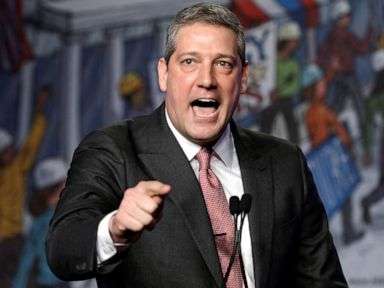
Yuri Gripas/Reuters
Democratic presidential candidate Rep. Tim Ryan speaks at the North America’s Building Trades Unions (NABTU) 2019 legislative conference in Washington, April 10, 2019.
The Ohio Democrat, who announced his candidacy on ABC’s “The View” on April 4, billed himself as someone who could unify the progressive wings of the Democratic Party with the more middle-of-the-road working-class voters.
“We have politicians and leaders in America today that want to divide us, they want to put us in one box or the other, ” he told the crowd at his kickoff rally in Youngstown on April 6. “You know, you can’t be for business and for labor; you can’t be for border security and immigration reform; right, you can’t be for cities and rural America; you can’t be for the North and the South; you can’t be for men and women. I’m tired of having to choose.”
Ryan, a more moderate voice in the crowded field of competitors, rose to the national political stage in 2016 when he launched a failed bid to replace Rep. Nancy Pelosi, D-Calif., as House minority leader. He had previously been floated as a potential candidate in the 2014 Ohio gubernatorial election.
On Oct. 24, he posted a video to announce that he was withdrawing from the presidential campaign.
“While it didn’t work out quite the way we planned, this voice will not be stifled,” Ryan said in a statement. “I will continue to advocate and fight for the working people of this country — white, black, brown, men, women.”
(MORE: Tim Ryan: Everything you need to know about the 2020 presidential candidate)
Former governor and Rep. Mark Sanford, R-S.C.
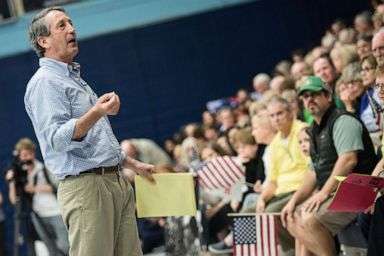
Sean Rayford/Getty Images
Rep. Mark Sanford (R-SC) addresses the crowd during a town hall meeting, March 18, 2017, in Hilton Head, S.C.
Former South Carolina governor and congressman Mark Sanford announced on Sept. 8 that he would challenge the president in the 2020 Republican primary.
In a tweet, Sanford outlined his reasons for running.
“We have a storm coming that we are neither talking about nor preparing for given that we, as a country, are more financially vulnerable than we have ever been since our Nation’s start and the Civil War. We are on a collision course with financial reality,” he posted.
Two months later, in November, he suspended his bid, telling reporters, “Based on the impossibility of trying to raise the issues I’ve been trying to raise which is debt, deficit, government spending in the midst of an impeachment. So call me a casualty of the impeachment process.” He added that he felt it was impossible to get meaningful debate on anything because of partisan fighting over the impeachment inquiry process.
Sanford’s tenure as South Carolina governor was rocked by scandal in 2009 after he secretly traveled to Argentina to meet with his lover, Buenos Aires resident Maria Belen Chapur. He confessed to having an extramarital affair in a news conference after his return.
He finished his term as governor and was elected to Congress several years later.
Rep. Eric Swalwell, D-Calif.
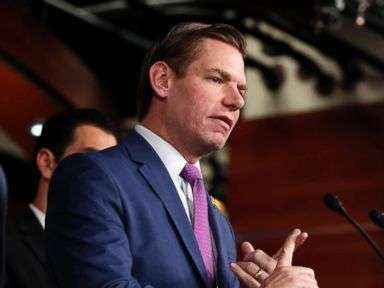
Alex Brandon/AP
Rep. Eric Swalwell, D-Calif. speaks during a news conference on Capitol Hill in Washington, May 17, 2017.
The California congressman and vocal critic of the president, Swalwell officially launched his bid for the Democratic nomination on April 8, during an appearance on “The Late Show” with Stephen Colbert.
Swalwell, who stopped in several early-voting states during the leadup to his announcement, was rooting his campaign’s agenda in the issue of gun control. Following his formal announcement, he held a town hall in Sunrise, Florida, with Marjory Stoneman Douglas High School students and families.
(MORE: Eric Swalwell: Everything you need to know about the 2020 presidential candidate)
“I’m telling folks, keep your rifles, keep your shotguns, keep your pistols, we just want the most dangerous weapons out of the hands of the most dangerous people,” Swalwell told ABC News Chief Anchor George Stephanopoulos on “Good Morning America” on April 9. “Most gun owners believe that.”
On July 8, he became the first of the more than 20 Democratic nominees to drop out of the race.
“I ran for President to win and make a difference in our great country,” Swalwell wrote in a news release. “I promised my family, constituents, and supporters that I would always be honest about our chances. After the first Democratic presidential debate, our polling and fundraising numbers weren’t what we had hoped for, and I no longer see a path forward to the nomination.”
Sourse: abcnews.go.com



